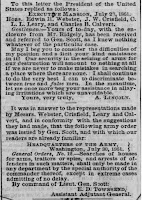Dixon-Welling Family Papers. Within the collections at the Connecticut Historical Society are the Dixon-Welling Family Papers containing letters and photos of the mover and shakers of the day.
This blog entry features one specific autograph manuscript letter written by President Abraham Lincoln on July 27, 1861 to Maryland members of the House of Representatives. The letter was given to James C. Welling, who during the Civil War was the managing editor of the National Intelligencer newspaper. Lincoln or his secretary forwarded Welling the original draft letter to publish in the National Intelligencer on 07 Aug 1861.
This blog entry features one specific autograph manuscript letter written by President Abraham Lincoln on July 27, 1861 to Maryland members of the House of Representatives. The letter was given to James C. Welling, who during the Civil War was the managing editor of the National Intelligencer newspaper. Lincoln or his secretary forwarded Welling the original draft letter to publish in the National Intelligencer on 07 Aug 1861.
 |
| Reprint of NI |
Interesting Correspondence
We find the subjoined correspondence in the National Intelligencer of yesterday:
House of Representatives, July 27.
To the President of the United States:
Sir: The undersigned beg leave to lay before you the enclosed letter of James L. Ridgley, Esq , of Baltimore county, in the State of Maryland. Mr. Ridgely gave a circumstantial account of a visit to his premises, and of a search thereof, made by a party of soldiers of the United States, professing to act by authority of tbe government, which seems to us to be very extraordinary and unnecessary. Mr. Ridgely is a distinguished citizen of Maryland, well known for his private virtues and for his uniform and consistent loyalty to the Union and the Constitution. Any statement proceeding from him is entitled to full confidence. In bringing this letter, and the facts detailed, to your notice, we avail ourselves of the occasion to express our regret that similar cases of military visitation and search, sometimes accompaned by arrest, have been permitted in Maryland, without just reason or necessity. Such visits, searches, and arrests, more than anything which has occurred, keep the minds of our people excited, and afford to the enemies of the Union means of continued agitation. We respectfully suggest the propriety of having the military restrained to acts in support of the civil authority; or, if cases arise in which the public welfare requires prompter action, then that no visit, search, or arrest be made, except upon the order of the officer in command of the district, in writing, setting forth the cause of the visit, search or arrest, and the proof upon which the order issued.
We have the honor to be, yours,
Edwin H. Webster, J. W. Crisfield, C. L. L. Leary, Charles B. Calvert.
P. S. Messrs. May and Thomas are not in the city, and hence they could not be consulted
To this letter the President of the United States replied as follows Executive Mansion, July 27, 1861
Hon. Edwin H. Webster, J. W. Crisfield, C. L. L. Leary, and Charles B. Calvert.
Gentlemen: Yours of to-day, with the enclosure from Mr. Ridgely, has been received and referred to Gen. Scott, as I knew nothing whatever of the particular case. May I beg you to consider the difficulties of my position and solicit your kind assistance in it. Our security in the seizing of arms for our destruction will amount to nothing at all if we are never to make mistakes in searching a place where there are none. I shall continue to do the very best I can to discriminate between true and false men. In the meantime, let me once more beg your assistance in allaying irritations which are unavoidable. Yours, very truly, A. Lincoln.
It was in answer to the representations made by Messrs. Webster, Crisfield, Leary and Calvert, and in conformity with the suggestions they had made, that the following army order was issued by Gen. Scott, and with which our readers are already familiar:
Headquarters of the Army, Washington, July 30, 1861. General Orders, No. 12.
Searches of houses for aims, traitors or spies, and arrests of offenders in such matters, shall only be made in any department by the special authority of the commander thereof, except in extreme cases admitting of no delay. By command of Lieut. Gen. Scott: E. D. Townsend, Assistant Adjutant General

